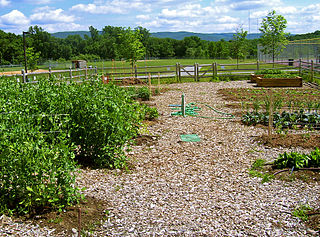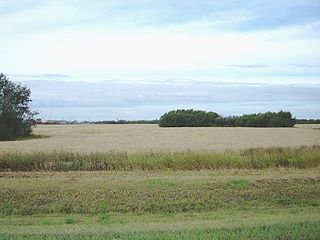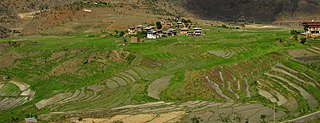Related Research Articles
The Monsanto Company was an American agrochemical and agricultural biotechnology corporation founded in 1901 and headquartered in Creve Coeur, Missouri. Monsanto's best-known product is Roundup, a glyphosate-based herbicide, developed in the 1970s. Later, the company became a major producer of genetically engineered crops. In 2018, the company ranked 199th on the Fortune 500 of the largest United States corporations by revenue.

Bridgewater is a town in Aroostook County, Maine, United States. The population was 532 at the 2020 census.

Presque Isle is the commercial center and largest city in Aroostook County, Maine, United States. The population was 8,797 at the 2020 Census. The city is home to the University of Maine at Presque Isle, Northern Maine Community College, Northern Maine Fairgrounds, the Aroostook Centre Mall, and the Presque Isle International Airport.

The following outline is provided as an overview of and topical guide to organic gardening and farming:

Percy Schmeiser was a Canadian businessman, farmer, and politician. In 1954, he took over the operations of the family owned farm, gas station, and farm equipment dealership. He renamed the farm equipment dealership Schmeiser's Garage and added a second farm equipment dealership in Humboldt, Saskatchewan in 1986 and oversaw their operations until their sale in 2003.

In agriculture and gardening, seed saving is the practice of saving seeds or other reproductive material from vegetables, grain, herbs, and flowers for use from year to year for annuals and nuts, tree fruits, and berries for perennials and trees. This is the traditional way farms and gardens were maintained for the last 12,000 years.

Acorn is a farm-based, anarchist, egalitarian, intentional community located in rural Louisa County, Virginia, United States. It is a member of the Federation of Egalitarian Communities. Acorn was established in 1993 as a spin-off of the Twin Oaks Community.

Monsanto Canada Inc v Schmeiser [2004] 1 S.C.R. 902, 2004 SCC 34 is a leading Supreme Court of Canada case on patent rights for biotechnology, between a Canadian canola farmer, Percy Schmeiser, and the agricultural biotechnology company Monsanto. The court heard the question of whether Schmeiser's intentionally growing genetically modified plants constituted "use" of Monsanto's patented genetically modified plant cells. By a 5-4 majority, the court ruled that it did. The Supreme Court also ruled 9-0 that Schmeiser did not have to pay Monsanto their technology use fee, damages or costs, as Schmeiser did not receive any benefit from the technology. The case drew worldwide attention and is widely misunderstood to concern what happens when farmers' fields are accidentally contaminated with patented seed. However, by the time the case went to trial, all claims of accidental contamination had been dropped; the court only considered the GM canola in Schmeiser's fields, which Schmeiser had intentionally concentrated and planted. Schmeiser did not put forward any defence of accidental contamination.
Southern Exposure Seed Exchange (SESE) is a cooperatively-owned seed company based out of Mineral, Virginia. SESE is a source for heirloom seeds and other open-pollinated (non-hybrid) seeds with an emphasis on vegetables, flowers, and herbs that grow well in the Mid-Atlantic region. SESE also supports seed saving and traditional seed breeding through their product line, through lectures and workshops, and by working with over 90 small seed-growing farmers in the Mid-Atlantic and other parts of the United States. SESE publishes an intermittent email newsletter and blog for gardeners, as well as the Southern Exposure Seed Exchange Catalog and Garden Guide.
Since the advent of genetic engineering in the 1970s, concerns have been raised about the dangers of the technology. Laws, regulations, and treaties were created in the years following to contain genetically modified organisms and prevent their escape. Nevertheless, there are several examples of failure to keep GM crops separate from conventional ones.

Genetically modified food controversies are disputes over the use of foods and other goods derived from genetically modified crops instead of conventional crops, and other uses of genetic engineering in food production. The disputes involve consumers, farmers, biotechnology companies, governmental regulators, non-governmental organizations, and scientists. The key areas of controversy related to genetically modified food are whether such food should be labeled, the role of government regulators, the objectivity of scientific research and publication, the effect of genetically modified crops on health and the environment, the effect on pesticide resistance, the impact of such crops for farmers, and the role of the crops in feeding the world population. In addition, products derived from GMO organisms play a role in the production of ethanol fuels and pharmaceuticals.

Agriculture in Saskatchewan is the production of various food, feed, or fiber commodities to fulfill domestic and international human and animal sustenance needs. The newest agricultural economy to be developed in renewable biofuel production or agricultural biomass which is marketed as ethanol or biodiesel. Plant cultivation and livestock production have abandoned subsistence agricultural practices in favor of intensive technological farming resulting in cash crops which contribute to the economy of Saskatchewan. The particular commodity produced is dependent upon its particular biogeography or ecozone of Geography of Saskatchewan. Agricultural techniques and activities have evolved over the years. The first nation nomadic hunter-gatherer lifestyle and the early immigrant ox and plow farmer proving up on his quarter section of land in no way resemble the present farmer operating huge amounts of land or livestock with their attendant technological mechanization. Challenges to the future of Saskatchewan agriculture include developing sustainable water management strategies for a cyclical drought prone climate in south western Saskatchewan, updating dryland farming techniques, stabilizing organic definitions or protocols and the decision to grow, or not to grow genetically modified foods. Domestically and internationally, some commodities have faced increased scrutiny from disease and the ensuing marketing issues.
Intensive crop farming is a modern industrialized form of crop farming. Intensive crop farming's methods include innovation in agricultural machinery, farming methods, genetic engineering technology, techniques for achieving economies of scale in production, the creation of new markets for consumption, patent protection of genetic information, and global trade. These methods are widespread in developed nations.

The Green Revolution was a period that began in the 1960s during which agriculture in India was converted into a modern industrial system by the adoption of technology, such as the use of high yielding variety (HYV) seeds, mechanized farm tools, irrigation facilities, pesticides, and fertilizers. Mainly led by agricultural scientist M. S. Swaminathan in India, this period was part of the larger Green Revolution endeavor initiated by Norman Borlaug, which leveraged agricultural research and technology to increase agricultural productivity in the developing world. Varieties or strains of crops can be selected by breeding for various useful characteristics such as disease resistance, response to fertilizers, product quality and high yields.

Agriculture in Bhutan has a dominant role in the Bhutan's economy. In 2000, agriculture accounted for 35.9% of GDP of the nation. The share of the agricultural sector in GDP declined from approximately 55% in 1985 to 33% in 2003. Despite this, agriculture remains the primary source of livelihood for the majority of the population. Pastoralism and farming are naturally complementary modes of subsistence in Bhutan.

Navdanya is an Indian-based non-governmental organisation which promotes biodiversity conservation, biodiversity, organic farming, the rights of farmers, and the process of seed saving. One of Navdanya's founders, and outspoken members, is Vandana Shiva, an environmental activist, physicist, and author. Navdanya began in 1984 as a program of the Research Foundation for Science, Technology and Ecology (RFSTE), a participatory research initiative founded by the environmentalist Vandana Shiva, to provide direction and support to environmental activism. "Navdanya" means "nine crops" that represent India's collective source of food security.
Bowman v. Monsanto Co., 569 U.S. 278 (2013), was a United States Supreme Court patent decision in which the Court unanimously affirmed the decision of the Federal Circuit that the patent exhaustion doctrine does not permit a farmer to plant and grow saved, patented seeds without the patent owner's permission. The case arose after Vernon Hugh Bowman, an Indiana farmer, bought transgenic soybean crop seeds from a local grain elevator for his second crop of the season. Monsanto originally sold the seed from which these soybeans were grown to farmers under a limited use license that prohibited the farmer-buyer from using the seeds for more than a single season or from saving any seed produced from the crop for replanting. The farmers sold their soybean crops to the local grain elevator, from which Bowman then bought them. After Bowman replanted the crop seeds for his second harvest, Monsanto filed a lawsuit claiming that he infringed on their patents by replanting soybeans without a license. In response, Bowman argued that Monsanto's claims were barred under the doctrine of patent exhaustion, because all future generations of soybeans were embodied in the first generation that was originally sold.

Delta & Pine Land Company was initially chartered in Mississippi in 1886 as a land speculation company, but was inactive until 1919, when a British textile company acquired the name. In the 1920s and 1930s, the company operated one of the largest cotton plantations in the Mississippi Delta, with headquarters in Scott, Mississippi. In the latter half of the 20th century, the company divested its farm lands, concentrated on research and development of cotton and soybean seeds, and became world-renowned for its development of Deltapine cotton varieties.
Monsanto was involved in several high-profile lawsuits, as both plaintiff and defendant. It had been defendant in a number of lawsuits over health and environmental issues related to its products. Monsanto also made frequent use of the courts to defend its patents, particularly in the area of agricultural biotechnology. Bayer acquired Monsanto in 2018, and the company has since been involved in litigation related to ex-Monsanto products such as glyphosate, PCBs and dicamba. In 2020 it paid over $10 billion to settle lawsuits involving the glyphosate based herbicide Roundup.
Will Bonsall is an American author, seed saver and veganic farmer who lives in Maine. He is a regular speaker about seed saving, organic farming and veganic farming.
References
- ↑ "Jim Gerritsen" (PDF).
- ↑ "Potato Culture of Aroostook County Maine USA". Maine Organic Farmers and Gardeners. Retrieved 2021-03-10.
- ↑ "083: Jim Gerritsen of Wood Prairie Family Farm Takes Us to Potato School". Farmer to Farmer Podcast. Retrieved 2021-03-10.
- ↑ "Board of Directors". OSGATA. Retrieved 2021-03-13.
- ↑ Organic Seed v. Monsanto, PubPat .
- ↑ Monsanto versus the people, Aljazeera. January 14, 2013.
- ↑ "Wood Prairie Family Farm In The News". Wood Prairie Family Farm. Retrieved 2021-03-10.
- ↑ "Homepage". Wood Prairie Family Farm. Retrieved 2021-03-10.
- ↑ Goad, Meredith (January 13, 2014). "Supreme Court won't hear Maine farmers' appealed lawsuit against Monsanto". Portland Press Herald . Retrieved 28 July 2014.
- ↑ "Jim Gerritsen" (PDF).
- ↑ "Jim Gerritsen: Organic Food Champion". Utne Reader . November–December 2011. Retrieved 28 July 2014.
- ↑ Moskin, Julia (December 5, 2011). "A Maine Farmer Speaks to Wall Street". New York Times . Retrieved 28 July 2014.
- ↑ "Jim Gerritsen | Former Owner of Wood Prairie Family Farm". The Maine Mag. 2017-06-28. Retrieved 2021-03-10.
- ↑ The Elders of Organic Farming, The New York Times. January 24, 2014.
- ↑ Agrarian Elders Conference Summary Archived 2015-09-07 at the Wayback Machine , Esalean Institute. January, 2014.
- ↑ Advantages & Challenges of Organic Farming: A Farming System Based on Harmony with Nature, Jim Gerritsen. April 22, 2014.
- ↑ Fishell, Darren (2018-05-29). "Maine organic farming icons file for bankruptcy". Bangor Daily News. Retrieved 2021-03-10.
- ↑ "Aroostook County organic potato farmers file for bankruptcy". Mainebiz. Retrieved 2021-03-10.